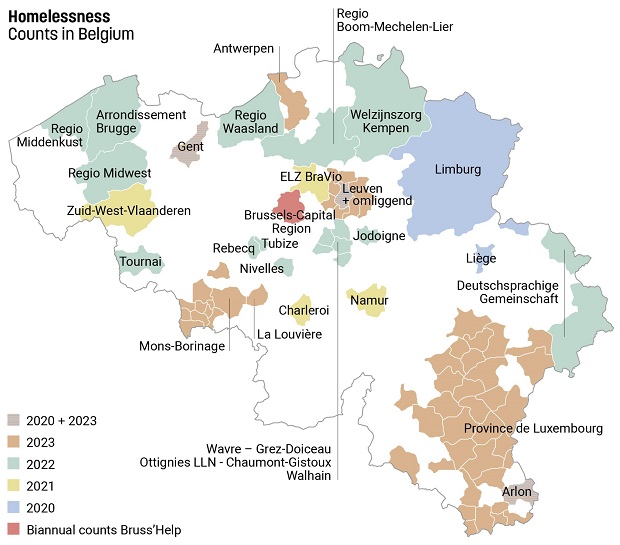- Daily & Weekly newsletters
- Buy & download The Bulletin
- Comment on our articles
Homelessness in Belgium not confined to cities, reveals far-reaching new report
Homelessness is not just a problem for population-dense cities, according to the latest report from the King Baudouin Foundation (KBF).
Belgium’s leading philanthropy institute, together with university research teams, has been pushing since 2020 for regular and uniform counts in the different regions in order to collect comparable figures that could inform policy making.
Their latest census involved point-in-time counts in Antwerp, Ghent, Leuven and more than nine surrounding municipalities. Censuses were also conducted in the Mons-Borinage area, La Louvière and part of the province of Luxembourg.
“Homelessness is a complex and multifaceted problem – a problem that is influenced by the local, but also supralocal, regional, federal, European and international context and policy,” KBF said in its report.
An estimated 8% of all persons counted live in municipalities smaller than 15,000 inhabitants. About half live in one of the 11 central cities in Flanders and about 30% live in cities and municipalities between 15,000 and 50,000 inhabitants.
The censuses captured not only the visibly homeless (people sleeping on the streets, in emergency shelters or in a nonconventional space such as a tent, car, squat, etc.) but also all persons excluded from the housing market.
“‘Visible homelessness’, which is a reality in Belgium, is only the tip of the iceberg,” KBF said.
Largest group of homeless off the streets
“Although this is mainly the case in the big cities, we see this phenomenon everywhere. The largest group of homeless people are those forced to spend the night with friends or family – a phenomenon that more often affects women and young adults.”
About one in 6 of all people who sleep outdoors do so in a municipality or city with fewer than 50,000 inhabitants, KBF found.

The overall figures from the latest census counted an estimated 19,479 homeless people in Flanders (13,533 adults and 5,946 children), 9,055 in Wallonia (4,342 adults and 4,713 children) and 192 people in the German-speaking community (131 adults and 61 children).
"This method of counting homeless people has great added value for implementing targeted policies, locally and regionally,” said Flemish minister for Brussels poverty alleviation Benjamin Dalle.
“This way we have reliable figures for more and more places and we can further refine the extrapolation for the entire Flemish Region. With this, we are building on the expertise from the King Baudouin Foundation and LUCAS KU Leuven, which is also seen as an example in the rest of Europe."
The percentage of minors accompanied by their parent(s) averaged 27.7%, with these children directly implicated in their parents' living situation. They were mainly staying in a shelter or temporary residence.
An estimated 42.3% of homeless people were outside the shelter system, staying with family and friends (27.6%) or in housing under threat of eviction (13.6%).
“Even though they do not sleep on the streets, their living situation is very unstable,” KBF pointed out.
Women make up one third of homeless population
The census also revealed that 33.5% of those counted are women, most of whom spend the night in temporary shelters for homeless people, with relatives or friends. “They are de facto less visible,” KBF reported.
“They tend to be homeless for less time than men. Half of the women have children directly involved. When children are involved, women stay in residential shelters or temporary housing in 40% of cases.”
The health situation of women without children directly involved is similar to that of men, and KBF reports “an obvious link between homelessness and health problems,” with less than a third of those counted said to have no health problems.
Mental health and addiction problems major factor
“Mental health problems (29.2%) and addiction problems (28.7%) are suspected in one-third of homeless persons,” the organisation found.
“Around 7% are suspected to have mental disabilities. Multiple health problems are suspected in 39% of those counted. Among both persons with mental health problems and addiction, it is notable that these persons are more often of Belgian nationality, are overrepresented in the 30-50 category and that at least 30% of them were staying with family or friends on the census day.”
The cities concerned can already use the available data to further guide their local approaches to homelessness.
“Following the past censuses, we could see that many local governments have started working with their figures to fine-tune their policies on homelessness,” KBF said.
Call for structural approach at regional and federal level
“However, the figures show that a structural approach to homelessness is also needed at regional and federal level.”
KBF’s methodology is also being experimented with in Europe, the organisation says, adding that northern neighbours have now started their second edition of censuses and from 2024, a census will be carried out in 15 different European cities under the coordination of LUCAS KU Leuven.
“We would like to emphasise that these counts could only take place thanks to the political courage and cooperation of the local authorities involved,” KBF said in its report.
“Fifty-eight cities and municipalities decided to map the problem on their territory and to start working with the data. We would therefore like to thank the local authorities and the 293 counting organisations for their commitment and involvement.”
LUCAS KU Leuven and CIRTES UCLouvain were involved in the research for the census.
Photos: ©KBF




















Comments
9,055 in Wallonia (14,342 adults and 4,713 children) ??
At least get the arithmetic straight!
So what are our very-well-paid politicians do about it?
They strive to create neighborhood size mouse-traps by bottle-necking every single urban area to asphyxia.
Create a mouse enclosure and you control the mice!
Hell, they can't even fornicate without your permit!